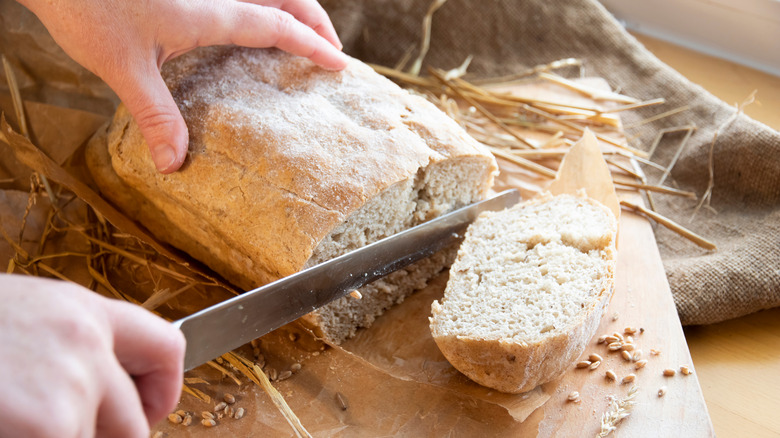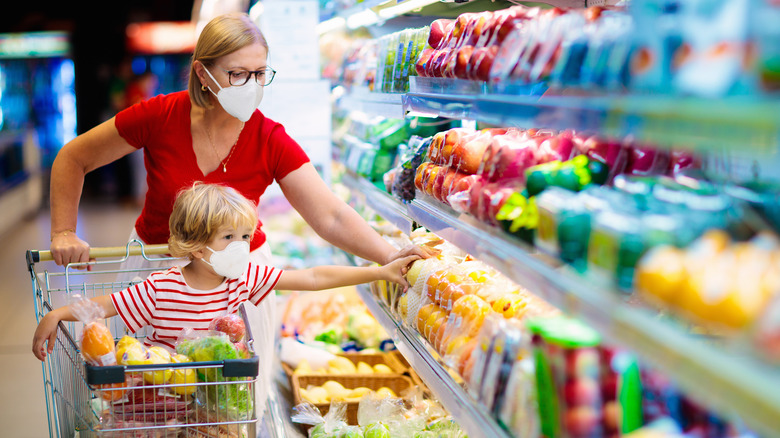Will The Delta Variant Cause Another Bread Shortage In 2021?
It feels like a distant memory: raiding grocery stores to stock up on all the supplies you could possibly need in order to prepare for a global pandemic, of which we knew very little at the time. From the likes of toilet paper, hand sanitizer, and disinfecting wipes, the world felt something like an apocalypse, akin to what we see in the movies. While we had a bit of respite due to the incredible amount of COVID-19 vaccinations that were circulating, many fear that the state of the world might be returning to how it was in 2020. Due to the ominous Delta variant of the virus, which many suggest is even more contagious than any other variant, anxieties — and COVID cases — are rising (via Deadline). What can we expect from the state of the world in light of this new variant?
It's no secret that the coronavirus pandemic has had a massive effect on businesses all around the world, with supply chains being disrupted, unemployment increasing, businesses being closed to consumers, and much more (via Business Insider). Therefore, it's important to know how we can get ahead of this curve as well as understand what resources might be important to stock up on while we can.
Will the Delta variant make the world look like it did during the 2020 pandemic?
Experts suggest that we are beginning to see as of late that are reminiscent of the trends we saw at the beginning of the 2020 COVID pandemic. According to Forbes, levels of inflation were at an all-time high, which led to highly sought after products being in short supply.
Whitehouse.gov presented an interesting study that used the supply-and-demand of toilet paper during the 2020 pandemic as a case study for what to expect this year. They explained that toilet paper became one of the most difficult resources to get your hands on due to an overall unexpected increase in demand. The outlet stated that an increase of people at home lead to a 40 percent increase in demand for toilet paper, which companies struggled to meet. As a result, Americans quite literally cleared the shelves of any and all toilet paper, fearing they would be left without it. The high demand was eventually met after implementing drastic tactics such as running plants at nearly 100-percent capacity and restarting previously used machines, as well as various other tactics that eventually made the demand achievable.
As a result, experts suggest that businesses will use the 2020 pandemic as an example and should hopefully be more prepared if the supply-and-demand is to return to how it was during the worst of the pandemic.
Bread was deemed a pivotal resource within the pantries of Americans
If there's one thing that the 2020 pandemic taught us, it's the importance of bread — and not only because everyone and their mother was learning how to bake bread during the unavoidable boredom that came with the COVID-19 lockdown. Indeed, the increase in supply-and-demand is something that bread companies and bakeries can attest to. According to Christine Cochran, executive director of the Grain Foods Foundation, the flour and bread industries worked harder than ever to produce enough products to meet the incredibly high demand. Cochran believes that COVID truly revealed bread as a vital pantry item, not only because of its versatility as a food item, but because of its comfort.
"What makes bread different from, say, ice cream or candy [...] is that almost 30% also find bread 'healthy and nutritious,'" said Cochran. "Taking a step back, all of this suggests that the breadbasket is unique and special because it provides both comfort and nutrition — it's therefore something that many Americans turn to, or return to, during times like these" (via High Plains Journal).
A task force has been established to address supply issues
Experts suggest that the shift in demand for bread might be changed forever as a result of his high demand during the pandemic — and demand that many believe will extend into a possible 2021 Delta-born pandemic.
But the hope is that, if another lockdown does happen, it won't be another like it was last year, as companies — and consumers, alike — will be prepared. In fact, according to Whitehouse.gov, a Supply Chain Distributions Task Force has been established that will address issues pertaining short-term supply issues. The Task Force will meet with stakeholders to address urgent supply-chain problems and address them as quickly as possible to as to prevent consumers from being without essential items.
Ultimately, the goal of the task force is to prevent grocery stores from becoming riot zones and for resources to not need to be hoarded. Hopefully, in the end, we won't experience any major supply shortages like we did during 2020.



